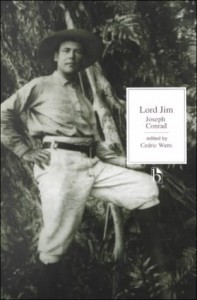Worth the effort

Conrad is perhaps my favourite (English language) writer from the turn of the last century. I find "The Secret Sharer" to be one of the greatest English language short stories ever written. And Nostromo is a favourite of mine. And yet it took me forever to get into this, considered by some to be among his very best work.
The biggest hangup for me was pointed out by reviews at the time: Once Conrad eventually adopts Marlowe as the narrator (something that doesn't happen immediately), we're supposed to believe Marlowe is telling this story - a story that goes on for the majority of the novel's 300 pages - to a group of people somewhere, in one continuous sitting, with barely a pause. That was apparently hard for some people to accept in 1900, but it's extremely hard to accept in 2016.
And that conceit still bugs me. And it's only Conrad's skill at handling both the early reveal about what really happened on the Patna and Jim's eventual fate that overcame what was otherwise eating at me for most of the novel.
The way Conrad and Marlowe tell the story is problematic, but it's also thought provoking. It's worth noting that Marlowe believes he is a trustworthy narrator, but some of his information - and especially all the information in the denouement - is secondhand, and I suspect this was a deliberate choice. A choice appears to have more and more significance as the novel progresses. (To wit, how much has Marlowe created Jim, and how much of the "real" Jim is in Marlowe's telling?)
Putting aside the narrative structure though, we have a compelling tale of a fallen man who tries to find redemption in a "civilizing mission" in what is now Indonesia, only to find he can never escape himself. In fact
SPOILER ALERT
There really is only one escape. And it's the power of that story that helps me get over the somewhat awkward narrative device, and Conrad's decision to essentially tell the story in three separate ways.





